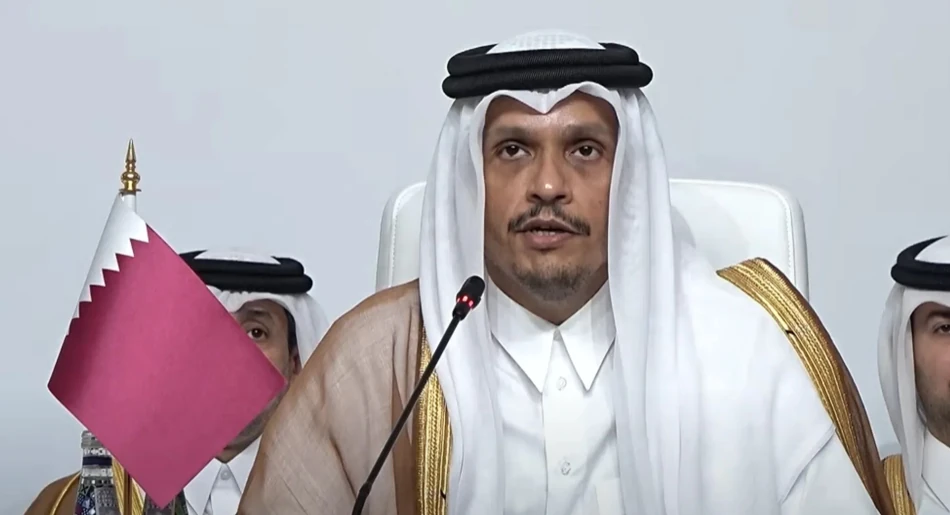
Qatar's PM Condemns Israeli Assault on Doha as 'State Terrorism'
Qatar Denounces Israeli Attack as "State Terrorism" While Vowing to Continue Gaza Mediation
Qatar's Prime Minister has condemned what he described as an Israeli attack on Doha as an act of "state terrorism," signaling a potential escalation that could complicate ongoing ceasefire negotiations for Gaza. The incident has prompted an emergency Arab-Islamic summit and unified condemnation across the region, raising questions about the future of Qatar's crucial mediating role in Middle East diplomacy.
Qatar's Defiant Response to Alleged Israeli Aggression
Sheikh Mohammed bin Abdulrahman Al Thani, Qatar's Prime Minister, delivered a forceful response during preparatory meetings for the emergency Arab-Islamic summit in Doha on Sunday. He characterized the Israeli action as "state terrorism" and pledged that Qatar would confront any threats using "all possible legal means."
Crucially, Al Thani emphasized that such actions would not deter Qatar from continuing its mediation efforts to end the war in Gaza. This stance underscores Qatar's determination to maintain its position as a key diplomatic broker despite what it perceives as direct intimidation.
Impact on Ceasefire Negotiations
The Qatari Prime Minister warned that the alleged Israeli attack would "lead to nothing but the abortion of de-escalation efforts" and demonstrates that "Israel recognizes no red lines." This assessment carries significant weight given Qatar's central role in facilitating talks between Hamas and Israel through its unique diplomatic channels.
Qatar has historically served as one of the few nations capable of maintaining dialogue with both Western allies and regional actors, including Hamas. Any disruption to this delicate balance could severely impact ongoing efforts to secure prisoner exchanges and humanitarian aid access to Gaza.
Regional Unity and Security Implications
Foreign ministers from Arab and Islamic nations responded with remarkable unanimity, declaring that Qatar's security is an integral part of Arab and Islamic national security. This collective stance represents more than diplomatic rhetoric—it signals potential coordinated responses should tensions escalate further.
The ministers characterized the alleged Israeli action as a "violation of international law and an escalation that threatens Arab, regional, and international security and stability." Such language typically precedes formal complaints to international bodies or coordinated diplomatic pressure campaigns.
Historical Context of Regional Mediation
Qatar's mediation role has proven invaluable throughout recent Middle Eastern conflicts. The country successfully facilitated the 2023 prisoner exchange that freed over 100 hostages from Gaza, demonstrating its unique diplomatic capabilities. Similar to how Switzerland maintained neutrality during World War II to serve humanitarian purposes, Qatar has cultivated relationships across ideological divides to function as a regional mediator.
The alleged attack on Qatar mirrors broader patterns of pressure on neutral mediators during conflicts. Turkey faced similar challenges when mediating between Russia and Ukraine, while Norway's role in Middle East peace processes has occasionally drawn criticism from conflicting parties.
Implications for Middle East Diplomacy
The timing of this incident appears particularly significant. With Gaza ceasefire negotiations at a critical juncture and regional tensions already elevated, any action that undermines Qatar's mediating capacity could have far-reaching consequences for conflict resolution efforts.
The emergency summit itself demonstrates the seriousness with which Arab and Islamic nations view this development. Such gatherings typically occur only during major regional crises and often result in coordinated policy responses or economic measures.
For international observers, this incident highlights the fragile nature of diplomatic mediation in active conflict zones. Qatar's ability to maintain its neutral stance while facing direct pressure will likely influence other nations' willingness to serve similar roles in future conflicts.
The broader question remains whether diplomatic immunity and neutrality can be maintained in an increasingly polarized regional environment, where even mediators may find themselves targeted for their peace-making efforts.
Most Viewed News

 Sara Khaled
Sara Khaled






